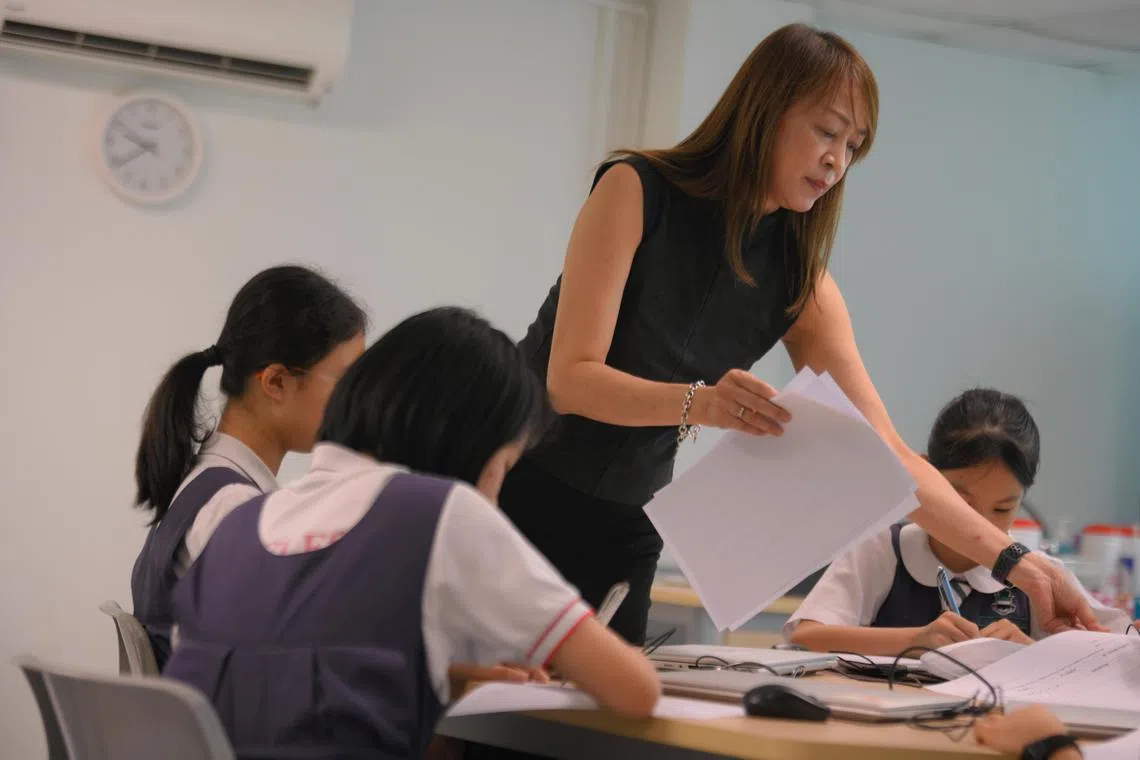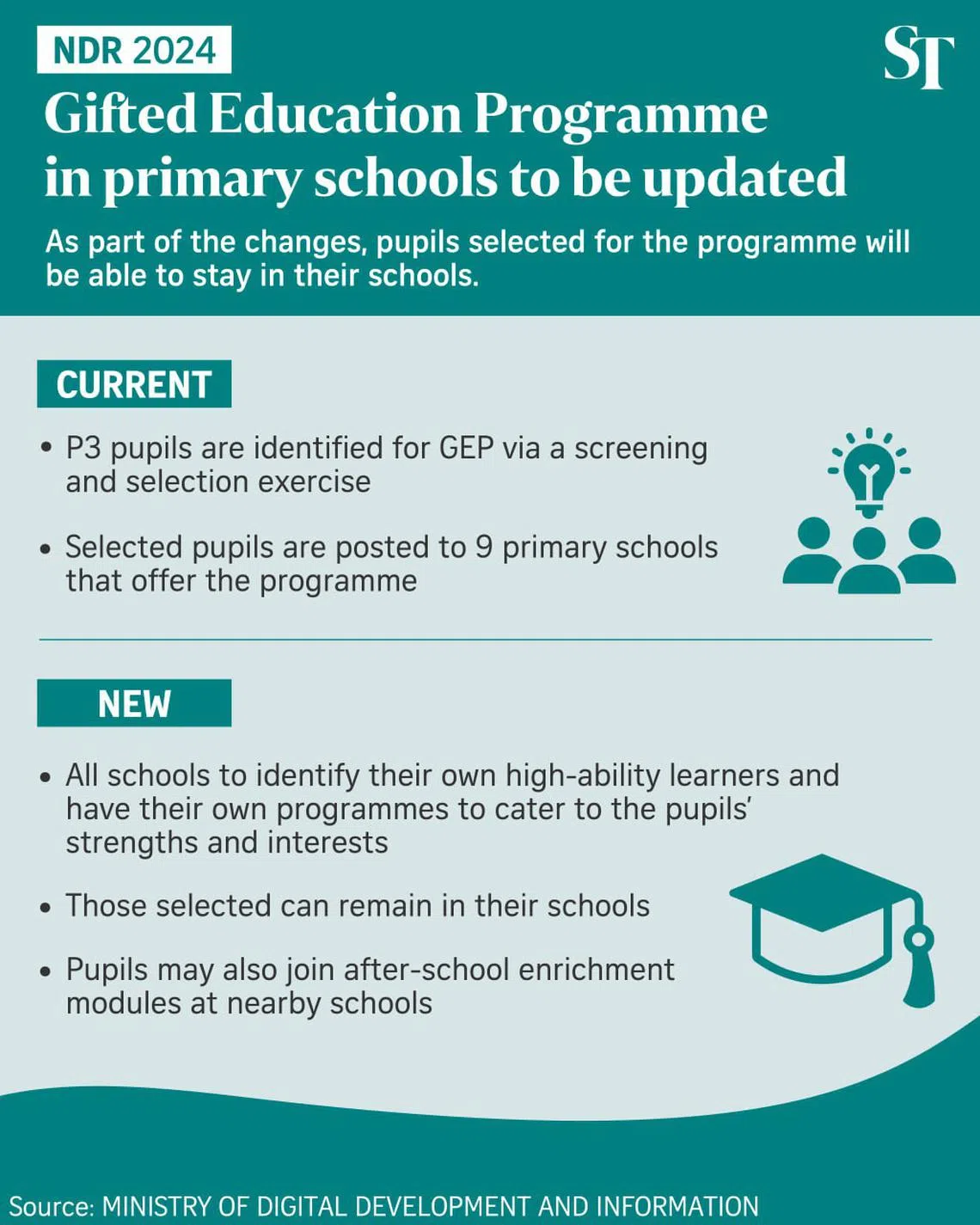NDR 2024: Gifted Education Programme to be updated; all primary schools to stretch high-ability pupils
Sign up now: Get ST's newsletters delivered to your inbox

Schools will be equipped to identify their own high-ability learners – which will benefit more pupils.
PHOTO: ST FILE
SINGAPORE – After 40 years, the Gifted Education Programme (GEP), which caters to the top 1 per cent of primary school pupils, will be discontinued in its current form and replaced with an updated approach to benefit more children.
All primary schools will be equipped to identify their own high-ability pupils and run programmes for them, Prime Minister Lawrence Wong announced in his first National Day Rally speech at ITE College Central on Aug 18.
PM Wong said: “We will discontinue the current form of the GEP in primary schools.
“We will replace it with a new approach to stretch students with higher abilities across all our primary schools.”
This will replace the current system, where Primary 3 pupils are selected from schools across the country for a centralised programme offered by nine primary schools, including Anglo-Chinese School (Primary) and Raffles Girls’ Primary School.
The updated programme will see pupils stay in their own primary schools, where they can remain with friends and teachers whom they have bonded with, PM Wong said.
Schools will be equipped to identify their own high-ability learners – which will benefit more pupils, he added.
Every primary school will have its own programmes to stretch these pupils in their areas of strength and interest, he said.
Beyond the school-based programmes, there will be some who can benefit from even further stretching in particular subjects, he said.
These pupils can come together for after-school enrichment modules in a nearby school, to learn and interact with one another, PM Wong added.
Education Minister Chan Chun Sing will share more details later, he said.
The GEP started in 1984 to nurture students who had higher abilities and to support and stretch them to their full potential, PM Wong said.
It caters for the needs of intellectually gifted pupils, who are identified through a two-stage exercise in Primary 3. Selected children are invited to join the programme in Primary 4.
Its curriculum covers the same content areas as those in the mainstream, but is extended in breadth and depth.
GEP students learn skills for independent inquiry and are encouraged to do explorations on self-selected areas of interest.
The programme started out 40 years ago in Rosyth and Raffles Girls’ primary schools, which took in pupils at Primary 4, and Raffles Institution and Raffles Girls’ School (Secondary), which took in students at Secondary 1.
It later expanded to nine primary schools and seven secondary schools at its largest.
“We have gained useful experience and lessons, and updated our approach along the way,” said PM Wong.
“After 40 years, I think it’s time to update the GEP.”
In 2004, the GEP for secondary schools was changed from a centralised programme to a system where schools conducted different programmes to benefit more high-ability students, he added, noting that this has worked well.
For primary schools, however, Singapore continued to identify and pull pupils out for the GEP, placing them into nine primary schools.

The plan to discontinue the current form of GEP in primary schools is a significant change, but one which is consistent with the Government’s philosophy in education, PM Wong said.
“Every child is different – they come into our school system with different abilities.
“We take care of all of them – not just the early bloomers and high-ability students, but also those like me – growing up in the heartland, attending PCF kindergartens and neighbourhood schools.”
He added that the Government will try to help every student learn, develop and grow, and realise their full potential, regardless of their starting points.
The move is an inclusive one that will help more children reach their full potential, said chairman of the Government Parliamentary Committee for Education Patrick Tay at the event.
Mr Tay, who is also the MP for Pioneer, said: “This review of the GEP means that whichever school you are in, you will have the support systems and mechanisms to be able to realise your passions, so that no one is left out.”
He added that he has, over the past few years in Parliament, called for a serious review of the GEP and its relevance in the present day, given a countrywide shift to focusing on multiple pathways to success.
He said: “Compared with many years ago, when we were very focused on the traditional skills like mathematics and languages, nowadays we value multiple talents, multiple passions, and we want to help everyone realise their full potential.”
Read more: Key announcements from PM Wong’s first National Day Rally
Watch PM Wong’s National Day Rally speech here:


